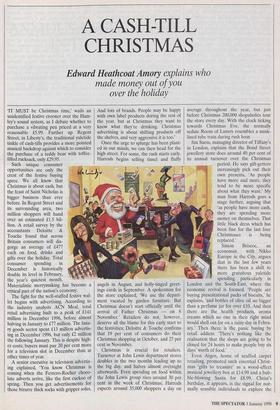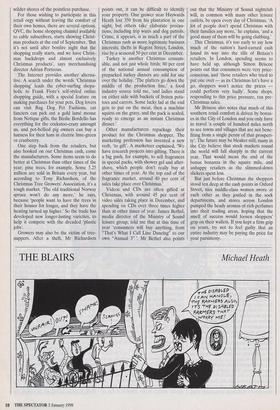A CASH TILL CHRISTMAS
Edward Heathcoat Amory explains who
made money out of you over the holiday
`IT MUST be Christmas time,' wails an unidentified festive crooner over the Ham- ley's sound system, as I debate whether to purchase a vibrating pen priced at a very reasonable £5.99. Further up Regent Street, in Liberty's, the traditional yuletide tinkle of cash-tills provides a more pointed musical backdrop against which to consider the purchase of a teddy bear with toffee- filled rucksack, only £29.95.
Such unique consumer opportunities are only the crest of the festive buying spree. We all know that Christmas is about cash, but the feast of Saint Nicholas is bigger business than ever before. In Regent Street and its surrounding area, two million shoppers will hand over an estimated £1.5 bil- lion. A retail survey by the accountants Deloitte & Touche found that across Britain consumers will dis- gorge an average of £477 each on food, drinks and gifts over the holiday. Total consumer spending in December is historically double its level in February, the year's quietest month. Materialistic merrymaking has become a critical part of the nation's economy. The fight for the well-stuffed festive wal- let begins with advertising. According to the industry analysts ACN Meal, total retail advertising built to a peak of £141 million in December 1996, before almost halving in January to £77 million. The luxu- ry goods sector spent £13 million advertis- ing in December 1996, but only £2 million the following January. This is despite high- er costs; buyers must pay 20 per cent more for a television slot in December than at other times of year. A senior executive in television advertis- ing explained, 'You know Christmas is coming when the Ferrero-Rocher choco- late adverts arrive, like the first cuckoo of spring. Then you get advertisements for those bizarre thick socks with gripper soles. And lots of brands. People may be happy with own label products during the rest of the year, but at Christmas they want to know what they're drinking. Christmas advertising is about shifting products off the shelves, and very aggressive it is too.'
Once the urge to splurge has been plant- ed in our minds, we can then head for the high street. For some, the rush starts early. Harrods begins selling tinsel and fluffy angels in August, and holly-tinged greet- ings cards in September. A spokesman for the store explained, 'We use the depart- ment vacated by garden furniture. But Christmas doesn't start officially until the arrival of Father Christmas — on 8 November.' Retailers do not, however, deserve all the blame for this early start to the festivities; Deloitte & Touche confirms that 19 per cent of consumers do their Christmas shopping in October, and 27 per cent in November.
Christmas is crucial for retailers. Turnover at John Lewis department stores doubles in the two months leading up to the big day, and halves almost overnight afterwards. Even spending on food within the John Lewis group rises around 30 per cent in the week of Christmas. Harrods expects around 35,000 shoppers a day on average throughout the year, but just before Christmas 200,000 shopaholics tour the store every day. With the clock ticking towards Christmas Eve, the normally sedate Room of Luxury resembles a mink- lined tube train during rush hour.
Jim Suess, managing director of Tiffany's in London, explains that the Bond Street jewellery store does around 40 per cent of its annual turnover over the Christmas period. He says gift-getters increasingly pick out their own presents, 'As people have more and more, they tend to be more specific about what they want.' My man from Harrods goes a stage further, arguing that `as people have more cash, they are spending more money on themselves. That little black dress which has been fine for the last four Christmases is being replaced.'
Simon Briscoe, an economist with Nikko Europe in the City, argues that in the last few years there has been a shift to more gratuitous yuletide spending, particularly in London and the South-East, where the economic revival is focused. 'People are buying presentational packs of biscuits,' he explains, 'and bottles of olive oil no bigger than a perfume jar for over £10. And then there are the health products, aroma creams which no one in their right mind would shell out for on a rainy day in Febru- ary.' Then there is the panic buying by retail addicts: 'There's nothing like the realisation that the shops are going to be closed for 24 hours to make people buy six days' worth of food.'
Even Argos, home of scuffed carpet retailing, promoted such essential Christ- mas 'gifts to treasure' as a wood-effect musical jewellery box at £14.99 and a bub- ble-blowing Santa for £8.99. Christ's birthday, it appears, is the signal for nor- mally sensible individuals to explore the wilder shores of the pointless purchase.
For those wishing to participate in this retail orgy without leaving the comfort of their own homes, there are several options. QVC, the home shopping channel available to cable subscribers, starts showing Christ- mas products at the end of September. 'But it's not until after bonfire night that the shopping really starts, and we have Christ- mas backdrops and almost exclusively Christmas products', says merchandising director Adrian Porteous.
The Internet provides another alterna- tive. A search under the words 'Christmas shopping' leads the cyber-surfing shopa- holic to Frank Fiore's self-styled online shopping guide, with a special feature on making purchases for your pets. Dog lovers can visit Rag Dog Pet Fashions, cat fanciers can pick out a gold lame mouse from Netique gifts, the Birdie Bordello has everything for the cockatoo-crazy amongst us, and pot-bellied pig owners can buy a harness for their ham in electric lime-green or cranberrry.
One step back from the retailers, but also hooked on our Christmas cash, come the manufacturers. Some items seem to do better at Christmas than other times of the year; pine trees, for example. Some 5.25 million are sold in Britain every year, but according to Tony Richardson, of the Christmas Tree Growers' Association, it's a tough market. 'The old traditional Norway spruce won't do any more,' he says, because 'people want to have the trees in their houses for longer, and they have the heating turned up higher.' So the trade has developed new longer-lasting varieties, to help it compete with the dreaded 'plastic jobs'.
Growers may also be the victim of tree- nappers. After a theft, Mr Richardson points out, it can be difficult to identify your property. One grower near Haywards Heath lost 350 from his plantation in one night, but others take elaborate precau- tions, including trip wires and dog patrols. Crime, it appears, is as much a part of the Christmas rush as more legitimate business interests; thefts in Regent Street, London, rise by a seasonal 50 per cent in December.
Turkey is another Christmas consum- able, and not just whole birds; 80 per cent of the national annual consumption of prepacked turkey dinners are sold for use over the holiday. 'The platters go down the middle of the production line,' a food industry source told me, 'and ladies stand on either side with buckets of frozen pota- toes and carrots. Some lucky lad at the end gets to put on the meat, then a machine squirts on the gravy, and the pack is sealed, ready to emerge as an instant Christmas dinner.'
Other manufacturers repackage their product for the Christmas shopper. The marketing profession has invented a new verb, 'to gift'. A marketeer explained, 'We have research projects into gifting. There is a big push, for example, to sell fragrances in special packs, with shower gel and after- shave, which people don't really buy at other times of year. At the top end of the fragrance market, around 40 per cent of sales take place over Christmas.'
Videos and CDs are often gifted at Christmas, with around 45 per cent of video sales taking place in December, and spending on CDs over three times higher than at other times of year. James Bethel, media director of the Ministry of Sound leisure group, told me that at this time of year 'consumers will buy anything, from "That's What I Call Line Dancing" to our own "Annual 3" Mr Bethel also points out that the Ministry of Sound nightclub will, in common with many other leisure outlets, be open every day of Christmas. 'A lot of people don't spend Christmas with their families any more,' he explains, 'and a good many of them will be going clubbing.'
This Christmas, it's too early to say how much of the nation's hard-earned cash found its way into the tills of Britain's retailers. In London, spending seems to have held up, although Simon Briscoe points out that consumers were very price- conscious, and 'those retailers who tried to put one over — as its Christmas let's have a go, shoppers won't notice the prices could perform very badly'. Some shops, responding to this price pressure, ran pre- Christmas sales.
Mr Briscoe also notes that much of this southern retail comfort is driven by bonus- es in the City of London and you only have to travel 'a couple of hundred miles north to see towns and villages that are not bene- fiting from a single penny of that prosperi- ty'. The future may be bleaker still; many in the City believe that stock markets round the world will fall sharply in the current year. That would mean the end of the bonus bonanza in the square mile, and unhappy retailers as the slimmed-down slickers spent less.
But just before Christmas the shoppers stood ten deep at the cash points in Oxford Street, nice middle-class women swore at each other as they jostled in the sock departments, and stores across London pumped the heady aromas of rich perfumes into their trading areas, hoping that the smell of success would loosen shoppers' grip on their wallets. If you kept a firm grip on yours, try not to feel guilty that an entire industry may be paying the price for your parsimony.



















































 Previous page
Previous page